Q: You got into research really early in your college career. Was that in your plan originally when you came to college?
A: I wanted to be really involved, but I wasn’t necessarily sure how I wanted to be involved, so this is an opportunity that came, surprising me.
Q: What sort of research were you conducting?
A: Our main motivation was the increased prevalence of intelligent virtual assistants, like Siri and Cortana, and how they can be utilized to help with older adults in relation to health-related tasks. A big problem or a big concern for us was how (older adults) are a vulnerable population in terms of understanding their privacy rights and how they can be protected. We wanted to increase transparency, which means the awareness of daily data use and maintenance, by finding some solutions to these common fears.
Q: And have you found some potential solutions?
A: Yeah, we have some potential solutions, which included an attractive video that would be like an airline video, a condensed terms and conditions, and an audio walk-through, as well as a simulation or game, which would cater to a younger audience to understand their privacy rights.
Q: What got you interested in the topic initially?
A: I was in the summer internship program this entire summer, so they matched me up with a mentor based on my interests, and Dr. Aqueasha Martin-Hammond had already had some prior experience with these sorts of studies, so she me brought me to this.
Q: Had you done any research before this summer?
A: I had not done any research prior to this, so this was a big eye-opening experience for me.
Q: Were you taking any other classes at the same time or was it just this research?
A: It was just this research, so I had a lot of time to look at information and develop my own hypothesis and really just understand research on my own.
Q: Do you think it was beneficial to have that time that you wouldn’t have had otherwise if you had been taking classes to be able to reflect?
A: It was definitely beneficial in terms of not having that extra workload as well as being able to interact with my research group, as well as having a lot of time to develop solutions.
Q: Are you planning to do more research on this topic or on other topics?
A: Yes, I do plan to do more research, and if I could do it in the fall if I am offered a position, that’d be great.
Q: What do you think the main benefit of undergraduate research is?
A: It really is an eye-opening experience; it broadens your horizons in terms of what academia is. It’s not always what is in a textbook because in and of itself research is looking into what is unknown and understanding what is unknown, so it really opened my eyes to what I would never develop in a classroom, as well as having that ability to network and to understand. These are brilliant professors, so you try to talk to them and to be able to work alongside them is something really amazing that we get to experience.
Q: How did you feel about presenting your research here today?
A: I thought it was going to be more nerve-wracking, but you kind of get into a groove or flow when you’re speaking to a person. It is different than speaking to a wider audience; it’s just the one-on-one type of thing, which makes it less nerve-wracking, as well as when you really know your information and it kind of just rolls off your tongue.





